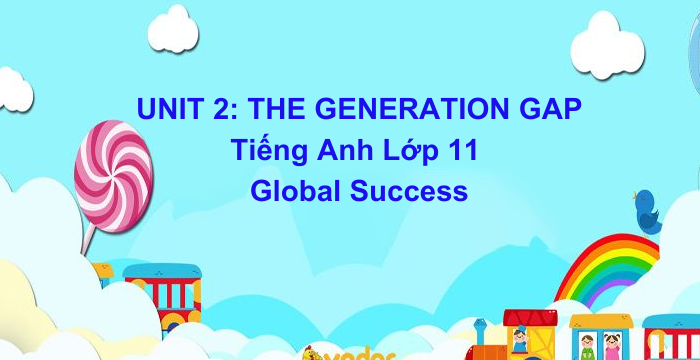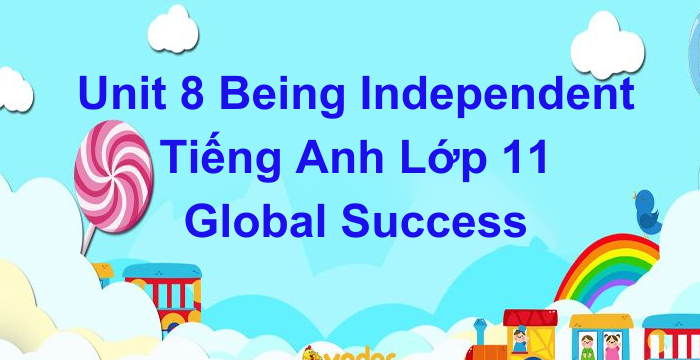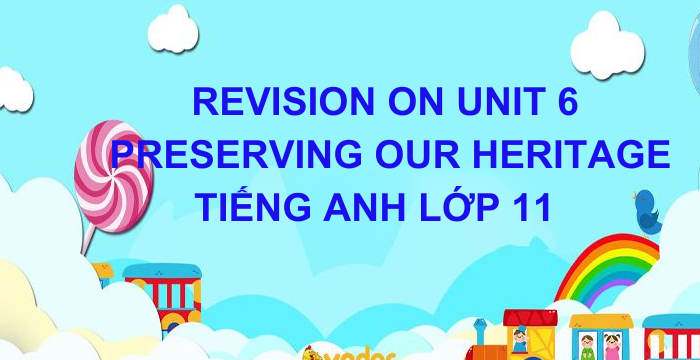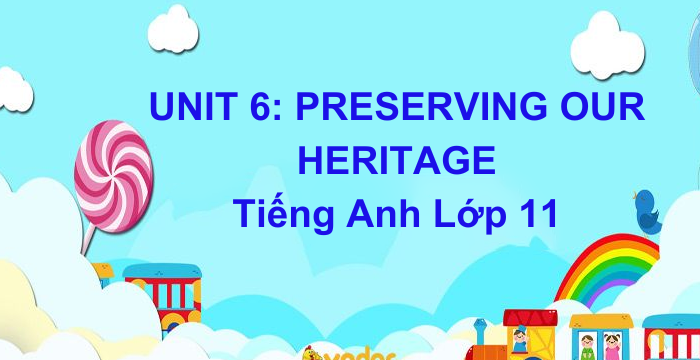Bài Tập Unit 2 The generation gap Tiếng Anh Lớp 11 Global Success (30.05.2024)
Thầy Thắng
CHUYÊN ĐỀ LỚP 11
15
Ngày đăng: 30-05-2024 10:48:02

UNIT 2: THE GENERATION GAP
EXERCISES
1. Circle A. B. C or D to indicate the word whose underlined part differs from the other three in pronunciation in each of the following questions.
- A. gap B. generation C. grandparent D. great
- A. gap B. application C. value D. behavior
- A. hold B. follow C. force D. notice
- A. control B. economic C. confidence D. condition
- A. argue B. breadwinner C. express D. extend
- A. footstep B. roof C. food D. fool
- A. believe B. extend C. respect D. gender
- A. control B. forbid C. force D. complain
- A. special B. common C. consist D. conflict
- A. complains B. forbids C. distracts D. follows
2. Circle A. B. C. or D to indicate the word that differs from the other three in the position of the primary stress in each of the following questions.
- A. follow B. gender C. footstep D. belief
- A. behave B. differ C. argue D. follow
- A. belong B. special C. exist D. allow
- A. refer B. prepare C. achieve D. curious
- A. value B. teamwork C. welcome D. accept
- A. create B. platform C. label D. notice
- A. permission B. difference D. argument D. cultural
- A. economic B. generation C. experience D. electronic
- A. expression B. important C. tradition D. influence
- A. eyesight B. worry C. respect D. limit
3. Circle A. B. C or D to indicate the correct answer to each of the following questions
E.g.: I have a terrible headache, so I__________leave early.
A. have to B. must C. ough to D. should
- Our family is going to travel abroad this summer, so we__________get our passport soon.
A. ought to B. have to C. must D. should
- Students__________look at their notes during the test.
A. don’t have to B. shouldn’t C. mustn’t D. ought not to
- You__________find time for some relaxation every day.
A. have to B. must C. should D. might
- Each generation is likely to have different thoughts about how the family__________ interact.
A. should B. must C. have to D. could
- All the students__________obey the school rules.
A. must B. ought to C. should D. have to
- My back has been hurting for weeks. I__________go to the doctor’s.
A. don’t have to B. have to C. mustn’t D. must
- My family__________pay a lot of taxes every year.
A. should B. has to C. must D. ought to
- The local authority is really strict about protecting that piece of lawn. You walk around it.
A. mustn’t B. ought not to C. shouldn’t D. don’t have to
- It is a great party but I__________go now.
A. should B. have to C. must D. ought to
- Sometimes parents__________be tolerant of their children’s childlike behaviours.
A. should B. must C. have to D. mustn’t
- All students__________complete their homework before going to class because it’s a rule.
A. ought to B. have to C. must D. should
- Parents__________spend more time talking to their children to enhance family bonding.
A. should B. shouldn’t C. must D. have to
- If you want to be a friend of your children, you__________change your mind about modern music and fashion.
A. don’t have to B. have to C. ought to D. ought not to
- The buffet restaurant is free for kids under 5 years olD. so you__________pay for your son.
A. shouldn’t B. mustn’t C. don’t have to D. ought not to
- You__________tell anyone about what I told you. It’s a secret.
A. mustn’t B. don’t have to C. shouldn’t D. ought not to
- I__________stay up late tonight because I have a lot of exercises to do.
A. have to B. should C. must D. ought to
- You__________judge other people based on their appearance.
A. don’t have to B. ought not to C. shouldn’t D. B & C
- Spectators__________show their tickets before they enter My Dinh stadium.
A. must B. have to C. should D. ought to
- Vietnamese visitors__________ought to have a Schengen visa to travel to Spain and Belgium.
A. must B. should C. have to D. may
- When playing in the water park, children__________be accompanied by adults.
A. should B. must C. have to D. ought to
- You__________drive If you don’t have a driving licence.
A. ought not to B. don’t have to C. mustn’t D. shouldn’t
- We__________book a table in advance at this restaurant. Just turn up and we’ll be served right away.
A. don’t have to B. shouldn’t C. mustn’t D. ought not to
- I think you__________let your daughter know your financial burden. She is mature enough to share with you.
A. have to B. must C. ought to D. might
- You__________respect your family values.
A. must B. mustn’t C. don’t have to D. have to
- I will give you 5 more minutes to complete your exercise, and you__________submit it to me at 10:30
A. must B. have to C. should D. ought to
- You__________have your hair dyed when you are a student. It’s forbidden.
A. don’t have to B. shouldn’t C. mustn’t D. ought not to
- Your children are very sensitive during their teenage years, therefore, you__________be rude to them.
A. should B. shouldn’t C. must D. mustn’t
- Teenagers__________spend too much time on social networks such as Facebook.
A. mustn’t B. ought not to C. shouldn’t D. couldn’t
- She__________attend extracurricular activities because she lives too far from the school.
A. mustn’t B. shouldn’t C. doesn’t have to D. ought not to.
- Everyone thinks that he__________follow his father’s footsteps and become a doctor.
A. should B. ought C. have to D. must
- All students ____ wear uniforms at school because it is a rule.
A. should B. have to C. ought to D. must
- You ____ finish your homework before you go to bed.
A. must B. have to C. should D. ought to
- This drink isn't beneficial for health. You ____ drink it too much.
A. should B. ought to not C. ought not to D. mustn't
- This warning sign indicates that you ____ step on the grass.
A. shouldn't B. mustn't C. don't have to D. ought not to
- I think you ____ do exercise regularly in order to keep your body in good shape.
A. must B. should C. ought to D. Both B and C
- I will lend you some money, but you ____ pay it back to me next week.
A. should B. have to C. must D. mustn't
- Hoa ____ feed the cats because her mother has done it already.
A. has to B. doesn't have to C. must D. Both A and C
- Those audiences ____ show their tickets before entering the concert hall.
A. have to B. must C. ought to D. don't have to
- The children ____ spend too much time playing computer games.
A. mustn't B. ought to not C . shouldn't D. Both B and C
- In case you're suffered from the injury, you ____ see the doctor today.
A. had better B. must C. ought D. have better
- Water park is free for kids under 6 years old. so you ____ pay money for your son.
A. have to B. mustn't C. should D. don't have to
- You look totally exhausteD. You ____ take a rest instead of working overtime.
A. should B. ought C. must D. has better
- Anyone ____ have a passport, even a visa when travelling all around the world
A. ought to B. must C. should D. has to
- In the peak season, travellers ____ book their accommodation in advance.
A. have to B. must C. should D. ought
- My car broke down yesterday, so I ____ catch a taxi to the office.
A. have to B. had better C. had to D. has to
- We ____ eat as much fruit as possible in order to get enough vitamins for our bodies.
A. had better B. should C. ought to D. All are correct
- You ____ tell anyone what I've revealed to you. It's still a secret.
A. mustn't B. had better not C. ought not to D. don't have to
- If you still want to maintain this relationship, you ____ behave improperly like that.
A. ought to not B. ought not to C. mustn't D. don't have to
- When playing or swimming in the pool, children ____ be accompanied by their parents.
A. should B. must C. don't have to D. have to
- We ____ go to work by car. Sky train is a wise choice during rush hour.
A. ought to B. mustn't C. shouldn't D. have to
4. Circle A. B. C or D to indicate the correct answer to each of the following questions
- The ________ refers to the difference in attitudes or behavior between a younger generation and the older one.
A. argument B. generation gap C. conflict D. disagreement
- Living under the same roof with three or four generations can be frustrating because of the lack of space, independence, and the daily ________
A. arguments B. debates C. conflicts D. quarrel
- He shared his father's ________ that people should work hard for their living.
A. belief B. gap C. arguments D. complaint
- Parents can't always respond effectively to agressive ____________ of their children
A. generation B. thought C. behaviour D. roles
- She works in television, following ________ her father's footsteps.
A. with B. on C. in D. of
- My parents _________ us advice, but never force us to do what they want.
A. give B. follow C. provide D. take
- My grandparents encourage me to __________ my dream to become an engineer
A. quit B. follow C. improve D. awake
- I deeply respect David _________ what he has achieved.
A. for B. about C. of D. to
- She found herself _______ conflict with her parents over her future career.
A. in B. out C. for D. on
- Everyone was _________ towards him, listening carefully to his long explanations.
A. respected B. respective C. respectable D. respectful
- Breadwinning and childcare are the ________ roles of men and women in society
A. respecting B. respective C. respectable D. respectful
- Julie and Mark aged 17 and 19 ___________
A. respectingly B. respectively C. respectably D. respectfully
- He ranked first in the public English speaking contest. It was a perfectly _______ result.
A. respecting B. respective C. respectable D. respectful
- Parents are pleased when their children know how to be__________ to others.
A. frustrating B. responsible C. respectful D. studious
- If you are a part of a (n) __________, you may live with your grandparents, aunts and uncles.
A. generation gap B. extended family C. nuclear family D. blended family
- Different__________in a family often result in interesting debates and occasional disagreements.
A. viewpoints B. hairstyles C. burdens D. trends
- I usually get into ___________ with my brother about trivial things.
A. differences B. conflicts C. generation gap D. unemployment
- One disadvantage of living in a/an _____ is that grandparents may see things from different viewpoints.
A. extended family B. nuclear family C. small family D. dormitory
- Some parents may also find their children’s behavior unacceptable and disrespectful to traditional _______
A. customs B. values C. spirits D. standard
- In order to ______ the gap between the old generation and the younger one, mutual understanding is the vital key.
A. bridge B. widen C. lessen D. lower
- The wisest solution would be for parents and their children to ________ each other as friends
A. cure B. treat C. show D. behave
- There is no need for gender ______ because men and women can do many of the same tasks.
A. issues B. equality C. roles D. gaps
- I live in a/an ____ with my parents and my elder sister in the coastal area
A. extended family B. nuclear family C. extended house D. nuclear house
- One advantage of living in a/an ____ is to strengthen relationship between young children and adults.
A. nuclear family B. nuclear house C. extended family D. extended house
- 13. In my opinion, family members are responsible for ____.
A. the housework B. the chores C. homework D. A and B
- 15. After graduating from university, I want to ____ my father's footsteps.
A. follow in B. succeed in C. go after D. keep up
- 17. Four generations living in the same roof will have different ____ of lifestyle.
A. gaps B. rules C. manners D. viewpoints
- 23. Generation ____ is the difference in the thoughts and viewpoints amongst generations living together.
A. distance B. gap C. space. D. All are correct
- 25. My parents don't let me get married until I graduate from university and they never ____ their mind about that.
A. keep B. impose C. focus D. change
- 26. The ____ arises when Jack and his parents have considerable disagreement on his choice of university.
A. discrimination B. conflict C. agreement D. gap
- If you just live with your parents and your siblings, you live in a _____.
- big family B. small family C. extended family D. nuclear family
- _____ in a multi-generational family are unavoidable.
- advantages B. habits C. conflicts D. punishment
- I usually get into ___________ with my brother about trivial things.
A. differences B. conflicts C. generation gap D. unemployment
- He doesn’t want to follow in his father’s ___________ as a doctor.
A. attitude B. privacy C. tradition D. footstep
- Over the past few years, in both the USA and the UK, the number of multi-generational households with three or four __________ living under the same roof has increased
A. generations B. generators C. generates D. generation
- My parents’ imposition ________ no difference to my decision of choosing the future career
A. gives B. pays C. takes D. makes
- John often _______ into conflict with his parents because he missed his curfew
A. put B. came C. got D. B&C
- My parents keep ___________ about my clothes.
A. complaining B. complain C. to complain D. complained
- Young people don’t always understand their parents’ points of views. _______, they prefer to be free to make their own decisions on their future career.
A. However B. Instead C. Furthermore D. Yet
- They came here last week, and we’ll pay a return visit _______ them in the summer.
A. for B. from C. to D. around
- He's always worrying ___________ his weight.
A. about B. for C. with D. of
- There have been changes in public attitudes _________ marriage
A. to B. towards C. about D. All are correct
- I’m going to complain ________ the authorities ________ the noise of the new cluB.
A. for/ about B. to/ for C. to/ about D. about/for
- My parents keep __________ me because they think they know what is best for me
A. control B. to control C. controlling D. controlled
- Pressure of childcare force young couples _________ back with their parents
A. move B. to move C. moved D. moving
- You can’t__________your child to watch the movie that he doesn’t like.
A. control B. forbid C. impose D. force
- Parents’ strict rules may put more__________on teenagers.
A. burden B. pressure C. problem D. stuff
- The major factor __________ the generation gap is lack of communication between parents and their children
A. causing B. resulting C. leading D. making
- Instead of _________ their children to do things in a very controlling way, parents try to explain what they expect them to do and why they should do that.
A. allowing B. permitting C. encouraging D. forcing
- Topics such as genders and drugs, which used to be avoided in family conversations are now more _______
A. common B. popular C. prominent D. dominant
- As children grow up, they want to be more ________, create their own opinions and make their own decisions
A. dependent B. dependable C. independent D. undependable
- I was tired and couldn't ____ on doing my research project properly.
A. concentrate B. look C. pay attention D. Both A and C
- All of my relatives are doctors—medical skill just _______ in the blood. That type of passion can't be taught.
A. flows B. runs C. move D. pass
- For Mrs. White, 30, her role as shop manager is a far _______ from her previous job as an air hostess.
A. laugh B. cry C. try D. run
- Breadwinning and childcare are the ________ roles of men and women in society
A. respecting B. respective C. respectable D. respectful
- Julie and Mark, aged 17 and 19 ___________
A. expectingly B. respectively C. respectably D. respectfully
- He ranked first in the public English speaking contest. It was a perfectly _______ result.
A. respecting B. respective C. respectable D. respectful
- If I were you, I would _________ the truth to your parents
A. say B. speak C. talk D. tell
- Everybody _______ fun of him because his family was poor
A. had B. made C. took D. gave
- I do not think that a different design would have significantly _____ a difference.
A. created B. made C. did D. formed
5. Fill in the blank with a suitable word given in the box
|
taste |
argument |
footstep |
expressed |
|
experience |
nuclear |
consist |
respect |
|
view |
extended |
gap |
curious |
- From the parental ____________, children are usually expected to follow traditional norms.
- It’s interesting that you and your parents have the same_____________in music
- One advantage of living in an _____________family is that there are more experienced members to ask for help when you are in a struggle.
- A lot of people think that life in a _____________ family is more comfortable because of less generation gap
- Open-minded parents find it less challenging to close the generation _____________ between them and their children.
- Single-parent families _____________ of one parent with his or her children
- She works in television, following in her father's ___________________.
- Later, he ________________ his regret that he hadn't taken his parents’ advice
- The children had an ___________________ about/over what game to play.
- The old generation will provide you with invaluable ___________________
- You should show your parents more ___________________ because they are the ones who care about you most.
- Babies are ___________________ about everything around them, always asking questions
6. Fill in the blank with a suitable word given in the box
|
critical |
social |
experiment |
hire |
complain |
|
upset |
limit |
tight |
eyesight |
career |
- Parents encourages their children to _____________________ new ideas or method to solve the problems
- You mustn't _______________________ your mother with agression and rebel
- _____________________ thinking skills enable students to evaluate information.
- Too much time on digital devices can damage ____________, reduce sleep time and cause weight gain.
- The generation gap in their family is mainly about differences in musical tastes, ___________ choice and lifestyles.
- _____________________ media are changing the way people communicate, work, and shop.
- Workers ___________________ about the conditions in which they are forced to work.
- You will need to ___________________ new staff when you develop your bussiness
- My parents ______________ my screen time so that I can have more time for outdoor activities
- Her grandma forbid her to wear ____________ jeans and high heels
7. Complete the following sentences with the correct forms of the words in capitals
- He shouldn't treat his parents __________________________. (DISRESPECT)
- My wife is _________________________ for cooking meals. (RESPONSIBILITY)
- We are in need of _________________________ professionals for this subject. (EXPERIENCE)
- There are at least three ___________________ living under the same roof in my family. (GENERATIONAL)
- Members of Generation Z born in a time of great technological developments and changes are called _____________ natives (DIGIT)
- Each generation has its _______________________, which are influenced by the historical, economic and social conditions of the country they live in (CHARACTER)
- Gen Xers are known as _______________ thinkers because they achieved higher levels of education than previous generations (CRITIC)
- Gen Zers are very _______________ and able to experiment with social platforms to suit their needs (CREATE)
- Many important _____________ documents were destroyed when the library was burned (HISTORY)
- _________________ is one of the common characteristics of Generation Y (CURIOUS)
8. Fill in the blank with a suitable preposition
- Generation gap is the difference __________ attitudes or behaviour between younger and older age groups, which can cause a lack of understanding
- We live with our parents, so we don’t have to worry __________________ childcare. Our mom helps us take care of our children when we go to work everyday.
- Generation gap refers __________________ the difference in the ways of thinking and perception in the people of two different generations
- They’re always arguing with each other __________________ money.
- She and I hold opposing views __________________ the matter of choosing an university
- Finally, I decide to follow __________________ my father's footsteps to work in state-owned enterprise.
- They came here last week, and we’ll pay a return visit _______ them in the summer.
- He's always worrying ___________ his weight.
- I never thought I could make it as an actor, but my parents always believed ______ me.
- My work at that time just consisted ________ typing letters.
- There’s a big difference ________ viewpoints between members in his family
- Her parents’ opinions make no difference ____________ her decisions
- Their lives are a far cry ____________ his own poor childhood
- She's always arguing ____________ her mother about trivial things
- I had a big argument with my brother ____________ small things this morning.
- His parents hold different views ____________ the university he should enter
- He wanted to follow ____________ his mother's footsteps and be a ballroom dancer.
- We had a discussion _________________ generation gap
- She had a lot of respect ___________ him as an actor, but didn't like the way he treated other members of the cast.
- Everyone was respectful ____________ him, listening carefully to his long explanations
9. Fill in the blank with a suitable preposition
- She looks down ____________ people who haven't been to college.
- They adored him and looked up ____________ him because of his dedication to charity
- He still lives ____________ his parents because of the high cost of housing
- They have no money and are forced to live ___________ charity
- We need to get more young people interested ___________ the sport.
- These days we rely heavily ___________ computers to organize our work.
- She showed a distinct lack _______ enthusiasm for the idea of becoming a mother.
- There have been changes in public attitudes _________ marriage
- I’m going to complain ________ the authorities ________ the noise of the new club
- Children’s growing need puts a burden _________ their parents
- My parents keep comparing me _____________ their friends’ children
- Her mom sympathized ___________ her because she had a lot of homework to do
- We are _________ need of will and determination to realize our dream
- I deeply respect David ___________ what he has achieved.
- She found herself ___________ conflict with her parents over her future career.
- His ideas on childcare may differ considerably ___________ those of other parents.
- Nuclear families consist ___________ parents and children
- John often comes ___________ conflict with his boss.
- This necklace belonged ___________ my grandmother.
- Their children have all grown ___________ and left home now.
10. Fill in the blank with a suitable preposition
- He's got some funny ideas about how to bring ___________ children.
- A new generation, labelled Gen Alpha will be _____________ the scene
- She's gone _____________ a lot of difficulties in order to achieve what she has.
- We're taking _____________ new staff at the moment.
- People of Generation Y are known ____________ their curiosity
- My parents are open ___________ new opinions
- Teenagers are good _____________ using electronic devices
- My parents keep complaining ____________ my clothes and hairstyles
- How long did you spend ____________ your homework?
- They have had several disagreements ____________ their neighbours.
- Kenvin mainly uses his smartphone and laptop ____________ his study
- Too much screen time is bad __________ teenagers’s health
- Was it really fair __________ the elder sister to ask her to do all the housework?
- Look __________ a computer or smartphone screen for a long time can damage their eyesight
- Too much screen time can lead ___________ sleep and weight problems
- The good thing about children is that they adapt very easily ___________ new environments.
- Due ___________ their different addtitudes, childrent may have cultural values different from their parents’s ones
- He was quite close ___________ his older brother and his baby sister
- You mustn’t wear shorts to school. It’s _____________ the school rules
- I think parents shouldn’t compare their children _______________ other’s.. They will become less confident ________________ their abilities
11. Circle A. B. C or D to indicate the word(s) CLOSEST in meaning to the underlined word(s)
- Traditional educating methods of parents can discourage children from becoming independent
A. conventional B. modern C. uncommon D. ineffective
- He got involved in a quarrel with his neighbour.
A. tradition B. argument C. debate D. controversy
- Open communication can bridge the gap between parents and children
A. accept B. increase C. widen D. shorten
- This flat is a far cry from the house they had before.
A. similar to B. completely different fromC. indifferent to D. extended
- Despite being a kid. Tuan always helps his mother do the chores every day.
A. homework B. works C. housework D. house duties
- I deeply look up to David for what he has achieved.
A. respect B. see C. disrespect D. force
- Their diet consisted of vegetables which are good for health
A. involved in B. made up C. was composed of D. excluded
- There were few similarities in the brothers' physical characteristics.
A. appearance B. feature C. quantity D. attractiveness
- Listening is an important part of the relationship between parents and children
A. special B. certain C. particular D. vital
- Her parents tried to influence her in her choice of university.
A. affect B. worry C. follow D. treat
- Another factor lies in differences in musical tastes, fashion, and political views between young people and their parents
A. ideas B. tastes C. opinions D. visions
- With the price increases, we are all having to economize from now on
A. spend B. waste C. tighten our belt D. save money
- We have learn valuable lessons from our grandparents
A. valueless B. worthless C. memorable D. invaluable
- The poor harvest caused prices to rise sharply.
A. led B. reasoned C. brought about D. resulted from
- She laid down strict rules for her tenants including prompt payment of rent.
A. law B. regulation C. power D. order
- Regardless of their children’s preference, they impose the profession they favor on their children (synonyms)
A. Rather than B. Apart from C. Irrespective of D. Because of
- Many parents find it hard to understand their children when they are teenagers.
A. adults B. elders C. adolescents D. kids
- There're many problems which are unavoidable when living in an extended family.
A. profits B. issues C. views D. merits
- The newborn baby takes after his grandfather. They both have dimples
A. cares for B. resembles C. differs from D. look after
- Their diet consisted of vegetables which are good for health
A. involved in B. made up C. was composed of D. excluded
- The poor harvest caused prices to rise sharply.
A. led B. reasoned C. brought on D. resulted from
- Teachers should differentiate clearly between different kinds of correction
A. differ B. tell the difference C. consider D. regard
- The two groups were similar with respect to income and status.
A. respecting B. in regard to C. concerning D. All are correct
- Could you lend me a hand and pick up Nam from school today?
A. shake hands with me B. join hands with me C. help me D. hand out
- I thought being excellent at computers runs in your family
A. is a common feature of a family
B. helps members in your family have good relationships
C. is available to use in your family
D. is what your family imposes on you.
- My parents always try to control me and compare me with their friends’ children
A. effort B. attempt C. afford D. impose
- She laid down strict rules for her tenants including prompt payment of rent.
A. law B. regulation C. power D. order
- Her parents always regarded her as the smartest of their children.
A. considered B. observed C. wished D. awarded
- Despite some conflicts, by and large, our family is very happy
A. In particular B. In general C. On the whole D. B & C
- Call me if you have any problems regarding your work.
A. respecting B. respected C. concerned D. in respect to
- Norms are standards of behavior that are typical or accepted within a particular group or society
A. unusual B. normal C. special D. specific
- My parents think that I am irresponsible but actually I am too busy to help around the house
A. free B. occupied C. full D. stressed
- There is one particular patient I'd like you to see.
A. general B. specific C. special D. normal
- After not speaking to each other for years, the two brothers decided to bury the hatchet/ difference.
- stop being unfriendly and become friends again C. argue with each other
- have an open discussion D. have a row
- Have you made up your mind which university you will enter?
A. offered B. planned C. decided D. enjoyed
- Many obese children are bullied at school due to their weight.
A. despite B. because of C. in spite of D. besides
- Carry on following your dream and you will be successful in the future
A. stop B. bring C. prevent D. continue
- In addition, she works as a nurse in the holidays.
A. Besides B. For example C. Therefore D. However
- Teenagers now values individualism, freedom, competition
A. appreciates B. costs C. evaluates D. complains
- She never attempted to explain her behaviour to her family.
A. affected B. quit C. tried D. complains
- Our lives have changed a lot since computers have come on the scene.
A. disappeared B. developed C. seen D. arrived
- She had very little office experience, so the company wouldn't take on her.
A. fire B. hire C. sack D. interview
- They relied on the advice of their parents and teachers
A. followed B. depended C. took D. accepted
- He had gone through a very difficult time before he succeeded in his business
A. experimented B. examined C. experienced D. adapt
12. Circle A. B. C or D to indicate the word(s) OPPOSITE in meaning to the underlined word(s)
- If you live in an extended family, you'll have great joy and get support of other members.
A. close family B. traditional family C. nuclear family D. large family
- Domestic violence is strictly forbidden all over the world
A. permitted B. limited C. restricted D. prohibited
- Jane found herself in conflict with her parents over her future career.
A. disagreement B. harmony C. controversy D. fighting
- I can't concentrate on my work because of the noise caused by my children.
A. focus B. abandon C. neglect D. allow
- We greatly respect my teacher for all of the best things that she brought to us.
A. look up to B. look forwards C. look for D. look down on
- There must be a mutual trust between parents and children
A. reliance B. belief C. defendant D. suspicion
- He was studying the complex similarities and differences between humans and animals.
A. distinction B. resemblances C. similarities D. B&C
- Although she was older than her husband. She was emotionally quite immature.
A. adult B. innocent C. childish D. childlike
- A typical working day for me begins at 7.30.
A. unusual B. representative C. normal D. ordinary
- John is the black sheep of the family. He is currently serving 5 years in jail for stealing a car
A. a member of a family who is regarded as a disgrace and an embarrassment
B. a member of a family who supports family by raising sheep
C. a member of a family who confers prestige on his family
D. a breadwinner
- They are terribly upset by the break-up of their parents' marriage.
A. sad B. worried C. happy D. funny
- Tight jeans and high heels are considered to be unsuitable for teenagers
A. loose B. lost C. relaxed D. soft
- She had very little office experience, so the company wouldn't take on her.
A. fire B. hire C. employ D. interview
13. Circle A. B. C or D to indicate the words/ phrases that need correction
- I (A) stayed up (B)late last night because I (C) mustn't go to school (D) on Sunday.
- We (A) ought to not play football (B)as (C) it's raining (D) outside.
- (A) According to the rules (B)of this game, you (C) had better not (D) drop the ball.
- (A) The school regulations (B)say that students (C) don’t have to (D) fight each other.
- You ought (A) to not be rude (B)to your friends; otherwise people (C) will say you (D) have no manners.
- (A) Some teenagers (B) want expensive clothes, which (C) can leads to financial burden (D) on their parents.
- I have to (A) tidied my room before my mother (B) comes back home. She (C) can't stand a (D) messy house
- She (A) should go (B) out late (C) at night because of danger
- She (A) have to speak English (B)well (C) because her current job (D) needs it
- (A) You must wear a helmet when you (B) ride a motorbike, (C) otherwise you will (D) be punished
- He (A) oughtn't to find another (B) solution to this problem if he (C) doesn't want to get (D) fired
- You (A) ought to stay up (B) at night, (C) which is (D) not good for your health
- We (A) haven't to (B)buy souvenirs (C) for Sally. She (D) doesn't like them
- You (A) don’t have to use (B) mobile phones (C) in the class because of their (D) negative effects
14. Circle A. B. C or D to indicate the words/ phrases that need correction
1. You (A) have to (B) made sure that children (C) don't play outside alone.
2. You (A) mustn't (B) uses the motorbike without a driver's license. It's (C) against the law.
3. Drivers (A) haven't (B) to stop at (C) yellow traffic lights.
4. You (A) ought (B) to taking him (C) to the emergency room.
5. During the lesson, (A) does you (B) have (C) to listen to your teacher carefully and take notes quickly.
6. Students (A) don't have to (B) consume (C) food or drink in the class or in the library.
7. Get out of the grass! (A) You (B) must walk on the grass (C) here.
8. The baby (A) is sleeping. (B) You (C) don't have to shout.
9. Lien, we (A) must (B) are (C) quicker or we will miss the last train to Hai Phong city.
10. You (A) have to (B) feed the dog. (C) I've already fed it.
15. Mark the letter A. B. C. or D to indicate the underlined part that needs correction
- (A) I will leave the party early (B) because (C) I must (D) studying for my exam.
- I (A) stayed up (B)late last night because I (C) mustn't go to school (D) on Sunday.
- We (A) ought to not play football (B) as (C) it's raining (D) outside.
- You (A) mustn't (B) to drive a car (C) if you (D) don't have a driving licence.
- If you (A) want some useful (B) advice, you (C) have better talk to your parents (D) about your problem.
- I (A) had stay at home 3 days (C) due to (D) snowing heavily.
- Because of his (A) poverty, he (B) has to (C) struggling to (D) make ends meet.
- (A) According to the rules (B) of this game, you (C) had better not (D) drop the ball.
- If you want (A) to get a higher mark in the next test, you (B) have better put (C) more effort (D) into vocabulary.
- We (A) shouldn't make an appointment (B) with this doctor. You (C) can see him whenever you (D) want.
- Look at the sky, it (A) is going to rain. (B) Thus, you (C) must bring (D) along a raincoat.
- I (A) ought to go home now (B) because I don't want (C) to walk in the (D) dark.
- (A) As our teacher said yesterday, we (B) ought to not worry (C) about the mid-term test. (D) Take it easy.
- This competition is (A) optional, so we (B) not (C) have to take part in (D) it.
- (A) Despite having (B) a little chance to win, you (C) should give up your dream (D) of becoming a star.
- The professor (A) told me that we (B) should give this assignment in (C) by Thursday at the (D) latest.
- What you (A) should do now is (B) to make slides for the presentation tomorrow as we have (C) a little time (D) left.
- You (A) have to apply (B) for this position (C) as soon as possible (D) since it has only three vacancies.
- Ms. Anna (A) will give a fascinating lecture at 8 a. m., (B) so you (C) should (D) be here at 7.45 to check in.
- My (A) advice is you (B) have to consider carefully (C) before (D) making the final decision.
16. Circle A. B. C. or D to indicate the correct response to each of the following exchanges.
- Lan: Mum, can I go to my friend's birthday party this Saturday evening?
Lan's mother: ____________. Whose birthday is it?
A. None of my business B. Please do C. Certainly D. How dare you
- Lan: Is it OK if I stay the night at her house after the party?
Lan's mother: Oh, ____________. You must come back home before 10 p.m.
A. Go ahead B. Sorry to hear that C. Sure D. I’m afraid not
- Nam: Mum, can I invite my friends to party tonight?
Nam’s father: ____________. It would be great.
A. Of course you can B. Please don’t C. Sorry D. I’m afraid not
- Nam: Dad, do you mind if I color my hair?
Nam’s father: ____________. It is unsuitable for students like you.
A. Of course you can B. I’m sorry but that’s not possible
C. Go ahead D. I can’t agree more
- - “Would you mind if I opened the windows? It's too stuffy in here.” – “ __________”
A. Yes, of course. B. No, please do. C. I think it is OK. D. You look so tired
- “From my point of view, all family members should share the chores equally”. – “ __________”
A. It's a breathtaking view. B. You lied to me.
C. But you're right. D. There's no doubt about it.
- “I've been awarded a scholarship to Harvard University.” – “ __________”
A. Just kidding! B. It's up to you. C. Good job! D. Same to you. Thanks!
- “Don't forget to finish your homework before class”. – “ __________”
A. I'll do it later. B. Not much. C. It's quite difficult. D. Thank you for reminding me.
- “Thanks a lot for helping me fix the car yesterday.” – “ __________”
A. I'd love to. B. You're welcome. C. Of course not. D. I like it.
- “I've seen John at the workshop on communication skills.” – “ __________”
A. I see. I'll call him.
B. The workshop was very useful.
C. That can't be John because he's in Paris now.
D. No, I don't think so.
- “How do I sign up for the psychology course?” – “ __________”
A. You need to fill in the online application form first.
B. It's not yours.
C. The course was full.
D. Your deadline is May 15.
- “What's about going to the waterpark?” – “ __________”
A. That's a good idea B. That's right. C. Of course! D. I'm sorry I can't.
- “Hi, I'd like to buy three tickets for the Lost in Fear.”
A. How many tickets? B. I'm sorry. They were sold out.
C. We don't like this film. D. You should see other interesting films.
- “Do you enjoy buying souvenirs?” – “ __________”
A. No, I don't. B. No, thank you! C. Never mind D. No, I am not.
- “Which show would you like to watch, madam?” – “ __________”
A. Here you are! B. No, thanks. C. I am sorry. D. Pardon?
- “What did you do on Sunday?” – “ __________”
A. No way! B. Not much. C. It was great. D. I don't care.
- “I love listening to rock n' roll. How about you?” – “ __________”
A. I can't stand it. B. I can't help it. C. I can't do it. D. I can't wait for it.
17. Rewrite the following sentences as long as the meaning is unchangeD. using modals
- It is better for you to talk to your parents about your problem.
You ____________________________________
- If I were you, I would study hard to pass the exam
You __________________________________
- It is a good idea for us to learn vocabulary every day.
We __________________________________
- I’d advise you to tell the truth to your family
You ___________________________________
- It is not neccesary for us to wear uniforms every day
I ____________________________________
- We aren’t allowed to drive without wearing a helmet.
We _____________________________
- It is necessary for young people to plan their future career carefully
Young people _____________________________
- It is very important to pay attention to the content of the lesson.
You ___________________________________
18. Rewrite each sentence so that the new sentence has a similar meaning to the original one, using modals
- Parents find it unnecessary to satisfy all their children’s needs.
→ Parents don’t __________________________
- My advice is that you try to avoid all junk food
→ You _____________________________
- Am I required to show my identification card to process a bank transfer?
→ Do __________________________________
- Swearing every time you need to emphasize something is not a good idea
→ You ______________________________
- In the UK, you are not allowed to buy or drink alcohol in pubs or shops if you are under 18.
→ In the UK, you ___________________________
- Residents in this city are strictly forbidden to engage in any illegal religious activities.
→ Residents in this city _____________________________
- It’s my brother’s duty to clean the house every weekend
→ My brother ______________________________
- Visitors are not allowed to leave the island because of a terrible storm.
→ Visitors ______________________________
19. Rewrite the following sentences as long as the meaning is unchanged, using modal verbs
- I advise him to stop wasting money on lottery.
He ________________________________
- It's necessary for you to finish your homework before going to bed
You ________________________________
- It isn't necessary for you to bring food and drink for lunch.
You _________________________________
- Fishing is not allowed in this park.
You __________________________________
- Every receptionist in our hotel is obliged to wear a uniform.
Every receptionist in our hotel ________________________
- It's forbidden for shops to sell cigarettes to children.
Shops ________________________________
- It's optional for waiters to wear a tie.
Waiters ________________________________
- His doctor advises him not to drink too much alcohol.
He __________________________________
- It's obligatory for every employee to keep the company's information secret.
Every employee ___________________________________
- Teachers advise me to study English to get a good job
I _______________________________
20. Complete the sentences without changing the meaning.
- It is a good idea for me to do voluntary work.
I _____________________________________
- It is very important for us to do well at school.
We ___________________________________
- It is not necessary for me to agree with everything my parents say.
I __________________________________
- My parents never let me forget to do my homework.
My parents always ________________________
- They don’t allow me to stay overnight at my friend's house.
They don’t let _____________________________
- My mother expects me to work as a teacher like her.
My mother ________________________________
- He is interested in participating in social media
He is keen ________________________________
- His mother fobides him to play computer games
His parents don’t allow ______________________________
21. Rewrite each sentence using the word(s) in the brackets, without changing its meaning.
- If I were you, I would spend more time talking with children.
You ___________________________________
- John doesn't get permission to use that computer.
John _________________________________
- It is necessary that people who work here leave by 6 p.m.
People ________________________________
- Every staff isn't allowed to smoke or eat in the office.
Every staff ________________________________
- Customers are advised to check their luggage before leaving the airport.
Customers _________________________________
- It is forbidden for students to cheat in the exam
Students __________________________________
- Ms. Ly is in charge of cleaning the floor every day.
Ms Ly has __________________________________
- You are not allowed to take photographs in the museum.
You ______________________________________
- It would be a good idea for you to share the housework with your mother.
You ____________________________________
- It is not necessary for Jack to call Ben today.
Jack ____________________________________
22. Complete the following sentences, using given words
- Many/ teenager/ spend/ too/ much/ time/ digital/ device
______________________________________
- Parents/ should/ strictly/ limit/ children’s/ screen time/ because/ bad/ effect/ digial/ device
_________________________________________
- My/ parent/ keep/ complain/ clothes/ hairstyles
_________________________________________
- Lan/ not/ allowed/ colour/ hair/ or/ wear/ high heels
____________________________________
- Lien’s/ grandma/ not/ allow/ her/ wear/ tight jeans
_______________________________________
- Despite/ old age/ my/ grandparent/ open/ new/ ways/ thinking
____________________________________
- Young/ generation/ good/ use/ electronic/ device
________________________________________
- Nam’s/ parent/ not/ force/ him/ follow/ footstep
___________________________________________
23. Listen to the conversation. Decide if the following sentences are true (T) or false (F).
Quét mã QR code hoặc click vào để nghe
|
TRUE |
FALSE |
|
|
1. Linda's parents are pleased with her choice of clothes. 2. Tom shares Linda's opinion on clothes. 3. Linda wants to look more fashionable. 4. Tom's parents don't let him play computer games. 5. Playing computer games is a form of relaxation for Tom. |
24. Listen to the recording about relationship problems between parents and teenage I children. Decide whether the following statements arc true (T), or false (F) according I to the speaker.
Quét mã QR code hoặc click vào để nghe
|
T |
F |
|
|
1. Parents sometimes find it hard to talk to their teenage children. 2. Teenagers always like talking about their school work. 3. Teenagers hate questions that aim to check up on them. 4. Parents should push their teenage children to talk about school, work and future plans, if necessary. 5. Parents should watch for danger signs in some teenagers who may smoke or try using drugs or alcohol. |
25. Read the following passage and mark the letter A. B. C. or D to indicate the correct answer to each of the questions.
THE GENERATION GAP
People talk about the generation gap as a kind of division between young people and their parents. It is something which is generally a problem when children enter their teenage years, and (1)______ in complaints on both side. Parents, for example, can often be heard to say that young people are (2)______ and disobedient and in addition tend to be irresponsible when spending because they don’t appreciate the (3)______ of money. Adolescents, on the other hand. complain that their parents don’t understand them.
What has gone wrong? One explanation (4)______ in how society has changed. In the past, children would typically continue the way of life of their parents. In today’s world. parents are very (5)______ for their children because they want them to achieve more than they did. The problem is that the children often don’t agree with their parents’ plans. Teenagers also reach maturity at an earlier age than they used to and want their independence sooner. The resulting conflict is painful to both sides.
- A. leads B. brings C. results D. contributes
- A. disrespected B. disrespectful C. disrespectable D. disrespecting
- A. cost B. worth C. value D. amount
- A. puts B. stays C. lies D. comes
- A. ambitious B. demanding C. required D. expectant
26. Read the following passage and mark the letter A. B. C. or D to indicate the correct answer to each of the questions.
There are some ways by which generation gap can be bridgeD. Firstly, parents and their children have to be aware of the importance of open communication. In order to break the “ice” and rebuild a close parent-child relationship, communication is extremely crucial. Parents should not only concentrate (1) _________ their jobs and leave their children alone. They have to reserve some specific time to be with their children and show care to them. Similarly, children have to discuss serious things or big decisions with their parents as it (2) __________ respect to them. On the whole, both parents and children should try to explain their ideas to family members in a forgiving manner without anger or hatred
The second one is that parents must not put too much pressure on their children’s studies. Parents (3) _________ have too high expectation. They have to discuss their children’s progress with the teachers. Moreover, parents should work closely with schools through Parent-Teacher Association in order to participate in more talks and extracurricular activities with their children. (4) _________, parents should know what their children like the most. Indeed. they should give their children a chance to choose what they love if the choices resort to proper outlets. Accordingly, the generation gap between parents and their children can easily be bridged
- A. in B. for C. on D. with
- A. shows B. gets C. feels D. takes
- A. should B. shouldn’t C. have to D. must
- A. However B. Therefore C. As a result D. Furthermore
27. Read the following text and choose the best answer to fill in the blank
When a person (1) ___________ influenced by their friends or peers to behave in a certain way or adopt a particular type of behavior, dress, or attitude in order to fit in, this is peer pressure. Feeling accepted is a strong driving force for people of all ages, and so learning how to deal (2) _________ peer pressure—both positive and negative—is an important life skill. Peer pressure is usually perceived as something negative, such as when a person feels compelled by their peers—whether friends or not—to do something that they don’t want to do. The teen years are a time when many people experiment and push boundaries, often because they want to impress their friends. While negative peer pressure makes a person feel unhappy, unwell, or uncomfortable, positive peer pressure boosts a person’s feelings of wellness and (3) ____________. When individuals align themselves with positive people, the supportive atmosphere can lead to healthy choices. (4) ___________, when friends join a club or sports team, or work hard to achieve good marks, it can have a positive effect on everyone in that group.
- A. remains B. are C. feels D. smells
- A. to B. with C. for D. of
- A. arguments B. conflicts C. anger D. happiness
- A. For example B. However C. Therefore D. As a result
28. Read the following passage and mark the letter A. B. C. or D to indicate the correct answer to each of the questions.
My family are a funny lot. Take my father’s brother, Uncle George, for (1) ________. He’s the black (2) ________ of the family and nobody ever mentions him unless they are asked a direct question about him. He ran away to sea at the age of 15 and no one heard a(n) (3) ________ from him until he returned 20 years later. During his absence, he’d had a lot of adventures but he made no money at all and his brothers had to support him until he found himself a job. (4) _______ took a long time because he had no skills and training in any trade apart (5) ________ seamanship. During his time, he kept getting (6) ______ trouble and this also made him unpopular with his brothers. They, (7) __________, worked hard all their lives, supported their families and had no (8) _______ with people who seemed to have no sense of responsibility like Uncle George. As far as I am (9) _________, this makes them much less interesting than him and I don’t think it’s right that they should look (10) ______ on their brother. He may be the black sheep to them but to me after all his years of excitement and hardships at sea he seems a hero.
- A. instance B. examples C. sure D. good
- A. lamb B. sheep C. deer D. chicken
- A. word B. news C. sentence D. information
- A. who B. that C. which D. when
- A. of B. in C. for D. from
- A. on B. in C. into D. up
- A. therefore B. furthermore C. on the other hand D. what’s more
- A. sympathize B. sympathy C. sympathetic D. sympathetically
- A. concerned B. known C. worried D. anxious
- A. up B. down C. at D. for
29. Read the passage and do the tasks below.
The generation gap, which refers to a broad difference between one generation and another, especially between young people and their parents, usually leads to numerous conflicts. Such family conflicts can seriously threaten the relationship between parents and children at times.
It goes without saying that, however old their children are, parents still regard them as small kids and keep in mind that their offspring are too young to protect themselves cautiously or have wise choices. Therefore, they tend to make a great attempt to help their children to discover the outside world. Nevertheless, they forget that as children grow up, they want to be more independent and develop their own identity by creating their own opinions, thoughts, styles and values about life.
One common issue that drives conflicts is the clothes of teenagers. While teens are keen on wearing fashionable clothes which try to catch up with the youth trends, parents who value traditional clothes believe that those kinds of attire violate the rules and the norms of the society. It becomes worse when the expensive brand name clothes teens choose seem to be beyond the financial capacity of parents.
Another reason contributing to conflicts is the interest in choosing a career path or education between parents and teenagers. Young people are told that they have the world at their feet and that dazzling future opportunities are just waiting for them to seize. However, their parents try to impose their choices of university or career on them regardless of their children's preference.
Indeed, conflicts between parents and children are the everlasting family phenomena. It seems that the best way to solve the matter is open communication to create mutual trust and understanding.
Task 1. Decide whether the following statements are True, False or Not Given.
|
TRUE |
FALSE |
|
|
1. According to the passage, the relationship between parents and children is not easily destroyed by the family conflicts. 2. As children get older, parents let them live on their own way and do what they are interested in. 3. Teenagers try to please their parents by wearing traditional clothes. 4. Parents want children to follow their wishes in deciding the education and future jobs. 5. Some parents indulge their children with expensive brand name clothes. 6. In order to bridge the gap between the old generation and the younger one, open communication to promote mutual understanding is the vital key. |
Task 2. Choose the best answers for the following questions.
1. Why do most parents still treat their teenage children like small kids?
A. Because children usually make mistakes
B. Because they think that children are too young to live independently.
C. Because they think that children can't protect themselves well.
2. The word "offspring" in the second paragraph refers to ____.
A. parents B. children C. mind
3. What do parents usually do to help their children as they are young?
A. They prepare everything for their children.
B. They take care of their children carefully.
C. They encourage their children to explore the outside world
4. Which kinds of clothes do teenagers want to wear?
A. latest fashionable clothes B. casual clothes C. shiny trousers and tight tops
5. According to the passage, what are parents' viewpoints about the teenagers' clothes?
A. Teenagers' clothes get the latest teen fashion trends.
B. Teenagers' clothes are too short and ripped
C. Teenagers' clothes are contrary to the accepted standards and values of the society.
6. Why do teenagers want to choose their university or career?
A. They want to explore the world on their own.
B. They want to decide their future by themselves.
C. Both A and B are correct.
7. The word "seize" in the fourth paragraph is closest in meaning to ____.
A. catch B. choose C. find
8. Which can be the best title for the passage?
A. Where do parent-child conflicts come from?
B. How are children different from their parents?
C. How do we bridge the generation gap?
30. Read the following text and choose the best answer
The family dynamic evolves as a teen matures, and can test the parent-teen relationship. With both sides feeling mixed emotions, this time can be challenging.
Puberty brings lots of emotions for teens, and is a time of readjustment for the whole family. Parents have a huge influence on a young child’s values and interests, and so it can often feel hard for them to separate from their teen, who wants to develop their own identity and to have new freedoms. This may lead to conflict, as both parents and teens need time to figure out how to adapt the relationship.
As teens get older, it is important for them to take on responsibilities. This highlights the valuable contribution each family member makes to a home, and teaches teens about what it’s like to be an adult. Setting clear rules about routine and home life helps teens to know what’s expected of them—even if they do complain or resist. Expectations go both ways, however, and so constant communication and flexibility when necessary will help avoid conflict.
It is important for parents and teens to overcome life’s many distractions in order to spend quality time together. For parents, maintaining a close relationship with a teen who is preprogrammed to separate from them can be tricky, but it helps to be present and willing. Talking about the things that are going well is as helpful as discussing areas of conflict
- What is the main idea of the passage?
A. Puberty of teenagers
B. Teens’ romantic relationship
C. Parent-teen relationship
D. Teens’ responsibilities
- The word “this” in paragraph 2 refers to:
A. Puberty brings lots of emotions for teens
B. Parents have a huge influence on a young child’s values and interests
C. Both parents and teens need time to adapt the relationship
D. Parents cannot separate from their teens who want to be free
- The word “willing is CLOSET in meaning to
A. shocked B. ready C. strict D. sympathetic
- Which of the following is NOT TRUE about the sollution as teens get older?
A. Complain and resist
B. Communicate constantly
C. Set rules about routine and home life
D. Ask teens to take on responsibilities
31. Read the following passage and mark the letter A. B. C. or D to indicate the correct answer to each of the questions.
If parents bring up a child with the sole aim of turning the child into a genius, they will cause a disaster. According to several leading educational psychologists, this is one the biggest mistakes, which ambitious parents make. Generally, the child will be only too aware of what his parents expect, and will fail. Unrealistic parental expectations can cause great damage to children.
However, if parents are not too unrealistic about what they expect their children to do, but ambitious in a sensible way, the child may succeed in doing very well – especially if the parents are very supportive of their child
Michael Collins is very lucky. He is crazy about music and his parents help him a lot by taking him to concerts and arranging private piano and violin lessons for him. They even drive him 50 kilometers twice a week for violin lessons. Michael’s mother knows very little about music but his father plays the trumpet in a large orchestra. However, he never makes Michael enter music competitions if he is unwilling.
Winston Smith, Michael’s friend, however, is not so lucky. Both his parents are successful musicians, and they set too high a standard for Winston. They want their son to be successful as they are and so they enter him for every piano competition held. They are very unhappy when he does not win. Winston is always afraid that he will disappoint his parents and now he always seems quiet and unhappy.
Question 1. One of the serious mistakes parents can make is to ______.
A. push their child into trying too much B. help their child to become a genius.
C. make their child become a musician. D. neglect their child’s education.
Question 2. : Parents’ ambition for their children is not wrong if they ______.
A. force their children into achieving success B. themselves have been very successful
C. understand and help their children sensibly D. arrange private lessons for their children
Question 3. Who have criticized the methods of some ambitious parents?
A. Successful musicians. B. Unrealistic parents.
C. Their children. D. Educational psychologists.
Question 4. Michael Collins is fortunate in that ______.
A. his father is a musician B. his parents are quite rich
C. his mother knows little about music D. his parents help him in a sensible way
Question 5. The phrase “crazy about” in the passage mostly means ______.
A. “surprised at” B. “extremely interested in”
C. “completely unaware of” D. “confused about”
Question 6. Winston’s parents push their son so much and he ______.
A. has won a lot of piano competitions B. cannot learn much music from them
C. has become a good musician D. is afraid to disappoint them
Question 7. The word “They” in the passage refers to ______.
A. concerts B. violin lessons C. parents in general D. Michael’s parents
Question 8. All of the following people are musical EXCEPT ______.
A. Winston’s father B. Winston’s mother C. Michael’s father D. Michael’s mother
Question 9. The word “unwilling” in the passage mostly means ______.
A. “getting ready to do something” B. “eager to do something”
C. “not objecting to doing anything” D. “not wanting to do something”
Question 10. The two examples given in the passage illustrate the principle that ______.
A. successful parents always have intelligent children
B. successful parents often have unsuccessful children
C. parents should let the child develop in the way he wants
D. parents should spend more money on the child’s education.
32. Read the text and questions below, Mark the correct letter A. B. C or D for each question.
IS THERE REALLY A GENERATION GAP?
According to the results of a survey in USA WEEKEND Magazine, there isn't really a generation gap. The magazine's "Teens & Parents" survey shows that today's generation of young people generally get along well with their parents and appreciate the way they're being raised. Most feel that their parents understand them, and they believe their parents consider family as the No. 1 priority in their lives. Although more than a third of teens have something in their rooms they would like to keep secret from their parents, it is usually nothing more harmful than a diary or a CD.
Such results may seem surprising in the context of the violent events that people hear about in the media. Maybe because of the things they hear, parents worry that their own kids might get out of control once they reach the teenage years. However, the facts in the survey should make us feel better. The survey shows us that today's teens are loving and sensible. They are certainly happier than the angry people in the teenage stereotypes we all know about. True, some teenagers are very angry, and we need to recognize their needs, but the great majority of teens are not like that at all.
In contrast to some stereotypes, most teens believe they must be understanding about differences among individuals. Many of them volunteer for community service with disadvantaged people. When they talk about themselves, their friends and their families, they sound positive and proud. Generally, these are very nice kids.
Is this spirit of harmony a change from the past? Only a generation ago, parent-child relations were described as the "generation gap". Yet even then, things were not so bad. Most kids in the 1960s and 1970s shared their parents' basic values.
Perhaps, however, it is true that American families are growing closer at the beginning of this new millennium. Perhaps there is less to fight about, and the dangers of drug abuse and other unacceptable behavior are now well known. Perhaps, compared to the impersonal world outside the home, a young person's family is like a friendly shelter, not a prison. And perhaps parents are acting more like parents than they did 20 or 30 years ago.
- What did the survey find out about teenagers in paragraph 1?
A. They get along well with their parents. B. They appreciate good CDs.
C. They keep secrets from their parents. D. They stay in their rooms.
- What is the stereotype referred to in paragraph 2?
- Teens are people who recognize their needs.
- Teens are loving and sensible.
- Teens are much happier than we think.
- Teens are angry people.
- What does the word 'them’ in paragraph 3 refer to?
A. stereotypes B. individuals C. teens D. families
- What is the main idea of paragraph 3?
A. Differences between teens. B. Stereotypes about teens.
C. The positive attitude of teens to others. D. Volunteering for disadvantaged people.
- In the last paragraph, according to the writer, one reason why American families are closer is that ___
A. the dangers of drug abuse are less. B. there is no generation gap.
C. parents are friendlier to children. D. the world is an unfriendly place.
33. Read the following passage and mark the letter A. B. C. or D to indicate the correct answer to each of the questions.
In American, although most men still do less housework than their wives, that gap has been halved since the 1960s. Today, 41 per cent of couples say they share childcare equally, compared with 25 percent in 1985. Men's greater involvement at home is good for their relationships with their spouses, and also good for their children. Hands-on fathers make better parents than men who let their wives do all the nurturing and childcare. They raise sons who are more expressive and daughters who are more likely to do well in school - especially in math and science.
In 1900, life expectancy in the United States was 47 years, and only four per cent of the population was 65 or older. Today, life expectancy is 76 years, and by 2025, it is estimated about 20 per cent of the U.S. population will be 65 or older. For the first time, a generation of adults must plan for the needs of both their parents and their children. Most Americans are responding with remarkable grace. One in four households gives the equivalent of a full day a week or more in unpaid care to an aging relative, and more than half say they expect to do so in the next 10 years. Older people are less likely to be impoverished or incapacitated by illness than in the past, and have more opportunity to develop a relationship with their grandchildren.
Even some of the choices that worry people the most are turning out to be manageable. Divorce rates are likely to remain high, and in many cases marital breakdown causes serious problems for both adults and kids. Yet when parents minimize conflict, family bonds can be maintained. And many families are doing this. More non-custodial parents are staying in touch with their children. Child-support receipts are rising. A lower proportion of children from divorced families are exhibiting problems than in earlier decades. And stepfamilies are learning to maximize children's access to supportive adults rather than cutting them off from one side of the family.
- Which of the following can be the most suitable heading for paragraph 1?
A. Men's involvement at home
B. Benefits of men's involvement at home
C. Drawbacks of men's involvement at home
D. Children studying math and science
- Nowadays, ____ of men help take care of children.
A. 50% B. 41% C. 25% D. 20%
- According to the writer, old people in the USA ____.
A. are experiencing a shorter life expectancy
B. receive less care from their children than they used to
C. have better relationships with their children and grandchildren
D. may live in worst living conditions
- Which of the following is NOT true about divorce rates in the USA?
A. They will still be high.
B. They can cause problems for both parents and children.
C. More problems are caused by children from divorced families.
D. Children are encouraged to meet their separate parents.
- The word "equivalent” in paragraph 2 is closest in meaning to ____.
A. comparable B. opposed C. dissimilar D . constrasting
- The word "manageable” in paragraph 3 is closest in meaning to ____.
A. difficult B. challenging C. demanding D. easy
- The word “this” in the paragraph 3 refers to ____.
A. getting divorced B. minimizing conflict
C. causing problems to kids D. maintaining bonds
- According to the writer, the future of American family life can be ____.
A. positive B. negative C. unchanged D. unpredictable
34. Read the passage and choose the best answer to each of the following questions.
The generation gap between the parents and the children is due to the fact that the parents have experienced real life and whatever they have learned from personal experiences becomes a true knowledge for them. Suppose that they have succeeded in life by following a path, they may want their children to follow the same path for success. For example, if they have worked very hard in studies and got a good government job. they may advice their children to do the same for a having a good life as them. This also happens in other dimensions. The parents tend to treat their personal experiences as universal knowledge, which is false. What work for one person may not work for any other person because people have different talents and aptitudes. Moreover, the times have changed in the new generation and now a number of new avenues and challenges have come about which your parents have no idea or experience.
The children have no experience of the real life, hence they take a fresh look of everything in life. They may be guided by the experiences of their parents but they are also guided by the experiences of other people and by their own desires, talents and aptitudes. They want to experiment with their life and discover their own path. However, parents love their children so much that they don’t want them to suffer failure. They want them to be safe by following their path which is tested by them. This difference of opinion gives rise to the so-called generation gap.
1. What is the reason of the generation gap mentioned in the passage?
A. The parents assume that their personal experience in real life is true for them.
B. The parents want their children to get a good government job
C. The parents succeeded in life by following a path.
D. The parents give wrong advices to their children.
2. The word “universal” in line 6 means_________.
A. deserving respect, admiration, or support B. existing everywhere or involving everyone
C. clealy very much better than what is usual D. necessary or of great value
3. Why is treating personal knowledge as universal knowledge not reasonable?
A. Because people have different talents and aptitudes.
B. Because people gain knowledge from different contexts and apply it in different fields.
C. Because times have changed in different generations.
D. Both A and C are correct.
4. According to the passage, which factor does not guide the children in life?
A. Their own desires, talents and aptitudes. B. Their parents’ experiences.
C. Their own real life experiences. D. The experiences of other people.
5. What do the children want to do?
A. They want to suffer failure.
B. They want to be safe by following the path tested by their parents.
C. They want to experiment with their life and discover their own path.
D. They want their parents to love them so much.
35. Read the passage and decide whether the statements are True (T) or False (F).
A generation gap refers to the chasm that separates the thoughts expressed by members of two different generations. More specifically, a generation gap can be used to describe the differences in actions, beliefs, and tastes exhibited by members of younger generations, versus older ones.
The subjects at hand may be vast and varied but can include politics, values, and pop culture. While generation gaps have been prevalent throughout all periods of history, the breadth of differences of these gaps has widened in the 20th and 21st centuries.
Generation gaps play big roles in businesses because, in order to succeed, companies must find ways to balance the needs and views of individuals from different age groups. Businesses must be cognizant of the fact that changing demographics of their client base, including the typical genders of their patrons, can drastically affect their business cycles and bottom lines.
The term “generation gap” was first used in the 1960s. During that time, the younger generation in question— commonly referred to as “baby boomers”—showed a significant difference in their beliefs and opinions, compared to that of their parents’ generation.
Sociologists use nomenclature to refer to different generational segments. For example, millennials, which are those individuals born between 1982 and 2002, are called “technology natives” because they have lived with digital technology their entire lives, and this is all they’ve ever known.
By contrast, older generational members, known as “digital immigrants,” tend to be less comfortable with personal usage of technology. Consequently, technology companies market products differently to each group.
|
TRUE |
FALSE |
|
|
1. Generation gap can be used to describe the differences in actions, beliefs, and tastes. 2. The breadth of differences of generation gaps remains unchanged in the 20th and 21st centuries. 3. Changing demographics of the client base affects slightly bottom lines 4. During the 1960s, the younger generation had different beliefs and opinions compared their parents. 5. Individuals born between 1982 and 2002 are called “baby boomers”. 6. Older generational members don’t feel comfortable with personal usage of technology |
---THE END---
Giải đáp mọi thắc mắc trong đề - mua bản word và đáp án vui lòng liên hệ Zalo: 034 8371 758
Theo dõi fanpage để cập nhật nhanh các bài tập và đề kiểm tra mới nhất.
https://www.facebook.com/profile.php?id=61555984765050
Bài Viết Liên Quan

Unit 6 Preserving Our Heritage Tiếng Anh Lớp 11 Global Success (13.02.2025)

Unit 6 Preserving Our Heritage Tiếng Anh Lớp 11 Global Success (13.02.2025)

Unit 6 Preserving Our Heritage Tiếng Anh Lớp 11 Global Success (11.02.2025)

Bài Tập Unit 4 ASEAN AND VIETNAM Tiếng Anh Lớp 11 Global Success (28.11.2024)

Bài Tập Bổ Trợ UNIT 2 THE GENERATION GAP Tiếng Anh Lớp 11 Global Success (22.10.2024)

Bài Tập Bổ Trợ UNIT 1 A LONG AND HEALTHY LIFE Tiếng Anh Lớp 11 Global Success (02.10.2024)

Bài Tập Bổ Trợ UNIT 1 A LONG AND HEALTHY LIFE Tiếng Anh Lớp 11 Global Success (01.10.2024)

Bài Tập Bổ Trợ UNIT 1 A LONG AND HEALTHY LIFE Tiếng Anh Lớp 11 Global Success (25.08.2024)

Bài Tập UNIT 5 GLOBAL WARMING Tiếng Anh Lớp 11 Global Success (08.06.2024)

Bài Tập Unit 4 ASEAN AND VIETNAM Tiếng Anh Lớp 11 Global Success (07.06.2024)

Bài Tập Unit 3 Cities Of The Future Tiếng Anh Lớp 11 Global Success (31.05.2024)

Bài Tập Unit 1 A long and healthy Life Tiếng Anh Lớp 11 Global Success (21.05.2024)

File Nghe Unit 10 The Ecosystem Tiếng Anh Lớp 11 Global Success (14.04.2024)

Bài Tập Unit 9 Social Issues Tiếng Anh Lớp 11 Global Success (12.04.2024)

Bài Tập Unit 9 Social Issues Tiếng Anh Lớp 11 Global Success (2.04.2024)

Bài Tập Unit 10 The Ecosystem Tiếng Anh Lớp 11 Global Success (1.04.2024)

File Nghe Unit 9 Social Issues Tiếng Anh Lớp 11 Global Success (21.03.2024)

Bài Tập Unit 9 Social Issues Tiếng Anh Lớp 11 Global Success (19.03.2024)

Unit 8 UNIT 8: Being Independent Tiếng Anh Lớp 11 Global Success(19.03.2024)

Revision On Unit 7 Education Options For School-Leavers Tiếng Anh Lớp 11 Global Success 22.02.2024

File Nghe Unit 8 Being Independent Tiếng Anh Lớp 11 Global Success 19.02.2024

Unit 8 Being Independent Tiếng Anh Lớp 11 Global Success 19.02.2024

File Nghe Tiếng Anh Lớp 11 Global Success Unit 7 Education Options For School-Leavers

Unit 7 Education Options For School-Leavers Tiếng Anh Lớp 11 Global Success

Unit 7 Education Options For School-Leavers Tiếng Anh Lớp 11 Global Success

File Nghe Tiếng Anh Lớp 11 Global Success Unit 6 Preserving Our Heritage

Bài Tập Unit 6 Preserving Our Heritage Tiếng Anh Lớp 11 Global Success

Revision On Unit 6 Preserving Our Heritage Tiếng Anh Lớp 11 Global Success

Unit 6 Preserving Our Heritage Tiếng Anh Lớp 11 Global Success

Trắc Nghiệm Unit 6 Preserving Our Heritage Tiếng Anh Lớp 11 Global Success

Bài Đăng Gần Đây

Đề Cương Ôn Tập Giữa Học Kì 2 Tiếng Anh Lớp 7 Global Success (24.02.2026)

Đề Kiểm Tra Giữa Kì 2 Tiếng Anh Lớp 7 Global Success (3.2.2026)

Đề Kiểm Tra Cuối Kì 1 Tiếng Anh Lớp 10 Global Success (02.01.2026)

Đề Cương Ôn Tập Cuối Học Kì 1 Tiếng Anh Lớp 8 Global Success (30.12.2025)

